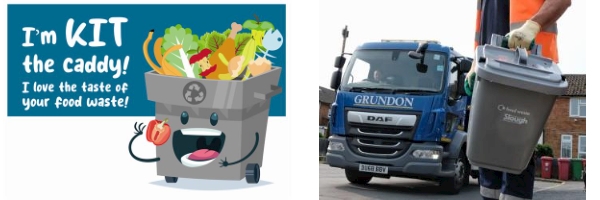
|
||
|
|
||
|
||
|
Food waste collections for all by April 2026 |
||
|
All residents in Slough will soon be able to recycle their food waste at the kerb as the weekly collection service rolls out across the borough.
The roll out follows a successful trial in five areas of the borough which has been running for a year.
The roll out will be taking place in phases, with the first phase area having caddies delivered as soon as Monday 3 November.
As each phase rolls out, residents will be delivered an indoor and outdoor caddy – along with a postcard informing them of their start date for collections.
The postcards feature a cartoon character, Kit the caddy, who loves the taste of food waste, to encourage whole families to get involved in using the new service.
Both the indoor and outdoor caddies are lockable to keep out pests and can be used with any type of bag – from old carrier bags to left over bread bags – no special types of bags are required.
The indoor caddy bags can just be tied up and popped into the outdoor caddy, cutting down on mess and smells.
And the outdoor caddies will be collected weekly on the same day as the red or grey bins making it as easy as possible for people to take part.
Councillor Gurcharan Singh Manku, lead member for environmental services, said: “Currently around 40 per cent or more of what goes in a normal refuse bin is food waste.
“Kit the caddy loves every morsel of food whether it is banana skins, vegetable peelings, leftovers of any kind, meat, fish and even bones, coffee grounds, tea bags and eggshells. As long as it is food it can go in the caddy.
“In fact, the only things that can’t go in is non-food waste like packaging, pet waste and garden waste.
“And residents don’t need to be worried about smells because the indoor caddy can be lined with a bin bag and emptied in the outdoor bin still in the bag!”
He added: “When refuse and recycling collections went to alternate weeks, we promised we would introduce weekly food waste collections to both free up space in the grey bins and cut down on summer problems like flies.
“It is also cheaper to dispose of food waste – with costs per tonne being less than 10 percent of the cost of normal rubbish.
“But the benefits of the food waste collection are not just financial, but environmental with each tonne of leftovers, bones, used tea bags, fruit and vegetable peelings being turned into green energy and fertiliser.”
The roll out phases are being undertaken in line with the refuse collection rounds of the council rather than geographical areas; when residents receive their caddies the accompanying postcard will give details of the start date for them.
Flats with communal bins will be brought on stream in April.
The roll out is expected to add approximately:
| ||
Reply to this message | ||
|
|




